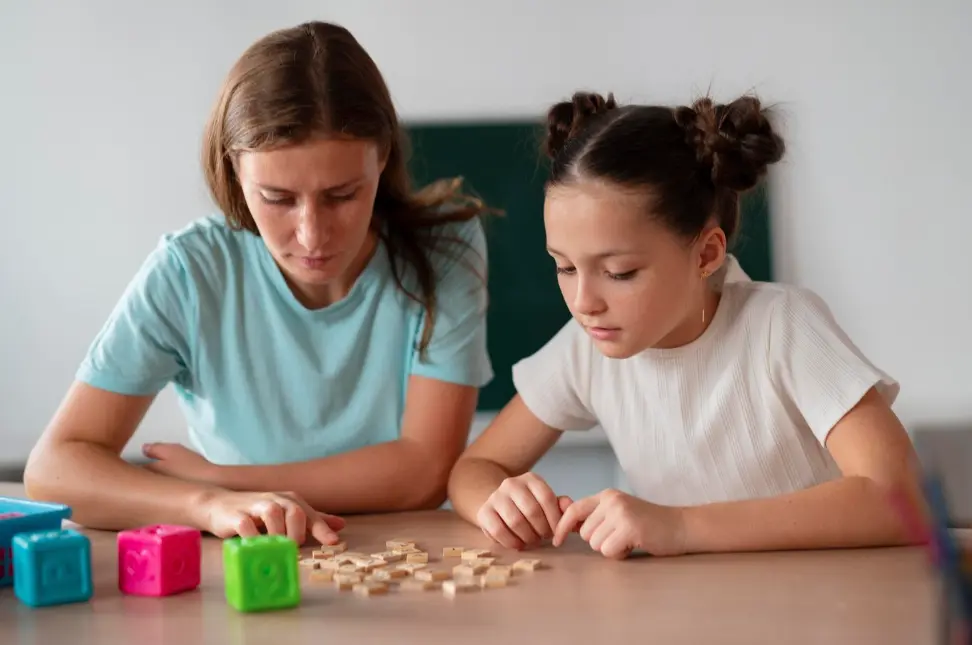From navigating toy-related conflicts to decoding challenging math problems, children of all ages encounter various hurdles in their daily lives. As parents and educators, our role isn’t solely to solve every problem for our kids but to empower them with the skills to overcome obstacles independently. Cultivating problem-solving abilities in children equips them to become confident, resilient, and successful individuals, aligning with the development of a growth mindset.
Teaching problem-solving skills is a gradual process, adapting to the evolving cognitive capacities and challenges faced by children at different stages of growth. Below, we’ll delve into key strategies and age-specific activities aimed at how to teach problems solving skills in kids.
General Strategies to Teach Problem-Solving at Any Age
1. Model Effective Problem-Solving: Demonstrating problem-solving approaches through a “think-aloud” method provides children with real-world examples. Emphasize that mistakes are part of the learning process and highlight the aspects within their control while addressing challenges.
2. Ask for Advice: Involve children in problem-solving scenarios, valuing their input. Encouraging them to offer solutions boosts confidence and fosters independence.
3. Avoid Providing the Answer: Allowing children to experience struggles, occasional failure, and subsequent learning from consequences fosters resilience and critical thinking.
Age-Specific Strategies and Activities
For Ages 3-5:
For toddlers aged 3-5, employing emotion coaching is pivotal in their development.
- By acknowledging and validating their feelings, caregivers can assist in emotional regulation, paving the way for effective problem-solving.
- Encouraging children to identify the specific challenge or “hard part” of a problem helps demystify difficulties, making them more approachable.
- Engaging in open-ended play activities like puzzles, dress-up games, or storytelling fosters imaginative and creative problem-solving skills.
Through play, children explore different scenarios, experiment with solutions, and learn to adapt—an essential foundation for problem-solving while enjoying the process of discovery and learning in a fun, interactive environment.
Problem-Solving Skills for Kids:
- Teach Problem-Solving Steps: Introduce a structured problem-solving process comprising identifying emotions, defining the problem, brainstorming solutions, considering consequences, and selecting a course of action.
- Crafting for Creativity: Utilize crafting materials to foster creative problem-solving without set rules, allowing children to explore possibilities.
- Pose Open-Ended Questions: Encourage critical thinking by asking open-ended questions that stimulate imaginative responses.
For Ages 7-9:
For children aged 7-9, learning to break daunting problems into smaller, digestible parts is crucial. Teaching this approach enables them to approach challenges methodically, easing overwhelm.
- Introducing problem-solving challenges using everyday household items engages their critical thinking and creativity. These tasks not only entertain but also encourage kids to explore unconventional solutions, enhancing their problem-solving skills in a playful manner.
- Empowering children to devise their own plans to attain goals fosters self-reliance and independence.
Encouraging independent thinking not only builds confidence but also equips them with valuable problem-solving tools, nurturing their ability to navigate obstacles with creativity and resilience.
For Ages 9-11:
Encouraging children aged 9-11 to document their problem-solving process nurtures structured thinking.
- By writing out problems, brainstorming potential solutions, and evaluating outcomes, kids learn the importance of reflection and derive lessons from their experiences.
- Introducing strategic activities such as chess or coding enhances their analytical skills and problem-solving abilities. Chess promotes strategic thinking, planning ahead, and considering multiple solutions—a skill transferable to real-life situations.
- Similarly, coding exercises encourage logical thinking and problem-solving as kids learn to break down complex challenges into manageable parts.
Engaging in these activities not only makes learning enjoyable but also equips children with valuable problem-solving tools applicable beyond the game or coding exercises.
Problem Solving Skills for Teens:
Encouraging teens to embark on meaningful projects rooted in their passions cultivates problem-solving skills while fostering personal growth.
- By aligning tasks with their interests, adolescents engage in hands-on learning, navigate challenges, and develop critical thinking.
- The SODAS Method, a systematic problem-solving approach, aids in analyzing situations, exploring various options, weighing their disadvantages and advantages, and ultimately crafting effective solutions.
- Participation in problem-solving groups or clubs promotes teamwork, diverse perspectives, and the exchange of ideas, empowering teens to tackle complex issues collectively.
These strategies not only enhance problem-solving abilities but also instill confidence and resilience in navigating real-world challenges.
How Much Effort Should Parents & Teachers Put In to Make the Child a Problem Solver?
Parents and teachers should foster problem-solving skills by providing guidance and opportunities for children to tackle challenges independently. Balancing support with allowing space for trial and error is crucial. While offering guidance and encouragement, it’s vital to gradually empower kids to navigate problems themselves, building their confidence and resilience.
Hence, Dr. Kishore’s Ratnam Schools as one of the most prominent schools in Nellore makes it its prime aim to inculcate such critical skills in its students so that they grow up to be leaders and well-rounded individuals. Collaboration between parents, teachers, and children is essential in fostering these critical skills.
Conclusion
In essence, guiding children to become proficient problem solvers necessitates a gradual process that blends structured guidance, encouragement of independent thinking, and exposure to diverse problem-solving scenarios. By implementing age-appropriate strategies and activities, parents and educators play a pivotal role in nurturing these invaluable skills in young minds, preparing them for success in an ever-changing world.

